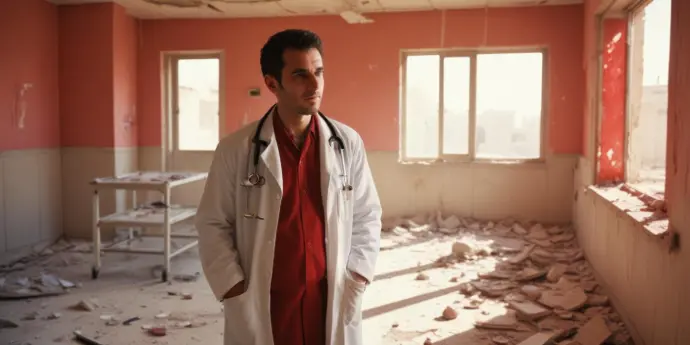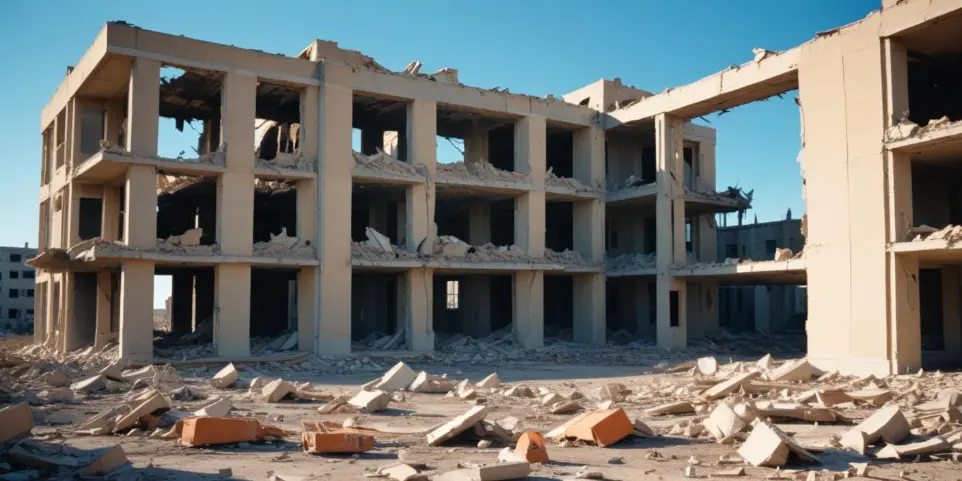In our feature article, "Hospitals in Focus: The Violation of the Right to Health in Wars," we will explore the shocking reality of the violation of the right to health in armed conflicts. Prepare for an in-depth and comprehensive analysis of this crucial topic. Are you ready to discover the truth behind this grave human rights violation? Go ahead, delve into our content and join the fight for global justice!

Introduction
In zones of armed conflict, the violation of human rights is a reality that affects millions of people around the world. One of the fundamental rights that is seriously compromised in these circumstances is access to health care. The violation of the right to health in situations of war is a highly relevant issue in the field of human rights, as it has devastating repercussions for the affected populations. In this context, it is crucial to thoroughly analyze the implications of this problem and the importance of guaranteeing access to health care in conflict zones.
Armed conflicts generate an environment of instability, violence, and constant violations of human rights. Civilian populations caught in the middle of these conflicts face significant challenges accessing basic services, such as healthcare. Hospitals and health centers become targets of attacks, exacerbating the precarious situation faced by people in need of urgent medical care.
Furthermore, armed conflicts lead to massive population displacement, making access to healthcare even more difficult. Health infrastructure is often severely damaged, and the lack of medical supplies and trained personnel exacerbates the humanitarian crisis. In this context, violations of the right to health are increasing, putting the lives and well-being of those caught in the middle of the conflict at risk. It is essential to understand the context in which these human rights violations occur in order to effectively address this problem and work to protect the affected populations.
Access to health care in conflict zones is vital to ensuring the survival and well-being of the affected population. Health care services are essential for treating war wounds, illnesses, and complications arising from the precarious living conditions of conflict. Furthermore, the presence of trained medical personnel and the availability of medications are determining factors in saving lives in emergency situations.
Access to health care also has a significant impact on the mental health of people affected by conflict. Psychological care and emotional support are essential to mitigate the trauma and stress of living in a war environment. Therefore, ensuring access to mental health services is crucial to addressing the comprehensive needs of the population in conflict zones.
In this regard, the protection of hospitals and health centers, as well as medical personnel, is a priority to ensure that affected populations have the opportunity to receive the necessary medical care in the midst of conflict. Access to health should not be a privilege, but an inalienable right of all people, even in the most adverse circumstances.
The violation of the right to health in war situations has devastating consequences for affected populations. Lack of access to quality medical services increases the risk of health complications, permanent disabilities, and even preventable death. Preventable and treatable diseases can become life-threatening when adequate medical care is unavailable.
Furthermore, the violation of the right to health in conflict has a lasting impact on the social and economic structure of affected communities. The loss of life, disability, and lack of access to adequate health services contribute to the perpetuation of the cycle of poverty and inequality in these areas. Communities' ability to recover and rebuild is severely hampered when they are deprived of access to health care.
Making the impact of the violation of the right to health in war situations visible is essential to promote concrete actions that protect and guarantee this fundamental right for affected populations. Preventing attacks on medical facilities and providing humanitarian assistance are essential measures to mitigate the impact of the violation of the right to health in contexts of armed conflict.
Violation of the Right to Health in Armed Conflict
The violation of the right to health in armed conflict is a problem that affects millions of people around the world. During war situations, hospitals and health centers become targets of military attacks, resulting in the interruption of essential medical services for the civilian population. This situation not only puts the lives of patients requiring medical care at risk, but also significantly impacts the response capacity of the health infrastructure in conflict zones.
Furthermore, the lack of access to medicines, medical supplies, and specialized personnel due to armed conflict further exacerbates the situation, leaving local communities unprotected and in precarious health conditions.
The magnitude of this problem is alarming, as it directly violates the fundamental right of every person to the enjoyment of the highest attainable standard of health, as established in the Universal Declaration of Human Rights.
The consequences of the violation of the right to health in armed conflicts are devastating for the civilian population. The disruption of health services, the destruction of medical infrastructure, and the shortage of basic medical supplies lead to a significant increase in preventable diseases and avoidable deaths.
Furthermore, there is a profound psychological impact on the population, generating high levels of stress, anxiety, and emotional trauma. The lack of access to necessary medical care to treat chronic illnesses and injuries resulting from violence further exacerbates the situation, perpetuating the suffering of the affected communities.
This situation also has a negative effect on the socioeconomic development of the affected areas, as the lack of access to health care undermines the population's ability to work, study, and contribute to the general well-being of society.
The responsibility to protect human rights, including the right to health, falls on both State and non-State actors involved in armed conflict. States have the obligation to respect, protect, and guarantee the right to health of all persons under their jurisdiction, even in times of conflict.
Furthermore, non-State armed groups have the responsibility to respect the norms of international humanitarian law, which expressly prohibit attacks on medical facilities and the blocking of access to medical care. The international community also has a fundamental role in protecting health in conflict zones, through monitoring, reporting violations, and providing humanitarian assistance.
It is crucial to establish effective mechanisms to ensure accountability for violations of the right to health in armed conflict, and to promote safe and unhindered access to medical care for all affected people, in line with humanitarian and human rights principles.
To understand the magnitude of violations of the right to health in current conflicts, it is crucial to compare them with historical conflicts that have had a significant impact on healthcare and hospital infrastructure. For example, World War II left a devastating toll in terms of destroyed hospitals, killed medical personnel, and limited access to healthcare for civilians and combatants alike. This comparison will help contextualize the current situation and highlight the importance of protecting healthcare services in conflict zones.
By analyzing more recent conflicts, such as the war in Syria or the conflict in Yemen, it is possible to identify worrying patterns of attacks on medical facilities, blockages of medical supplies, and obstacles for healthcare personnel. Comparing these events with similar situations in historical conflicts will highlight the persistence of violations of the right to health in the midst of war, as well as the urgent need for measures to protect healthcare services and ensure equitable access to healthcare in conflict zones.
This comparison can also highlight progress in recognizing the importance of protecting health services in armed conflict, as well as the remaining challenges and lessons to be learned from history to improve the protection of the right to health in the context of war.
Analysis of the Current Situation
The violation of the right to health in situations of armed conflict is a problem that affects millions of people worldwide. According to data from the World Health Organization (WHO), at least 50% of hospitals and health centers in conflict zones have been damaged or destroyed, drastically limiting access to medical care for the affected population.
Furthermore, it is estimated that around 1.8 billion people live in conflict-affected areas, significantly increasing the challenges to the provision of basic health services. These figures show the magnitude of the problem and the urgent need to address the violation of the right to health in these contexts.
In many cases, hospitals and health centers become deliberate targets of attacks, which not only endangers the lives of medical personnel but also deprives the civilian population of essential medical services at critical times. This situation raises serious questions about respect for international humanitarian law and the protection of medical facilities in armed conflict.
Statistics show that, on average, at least 20 attacks on health facilities occur each month in conflict zones. These attacks not only cause material damage but also have a devastating impact on the capacity of health systems to care for the affected population. A worrying example is the conflict in Syria, where hundreds of attacks on medical facilities have been documented since the beginning of the conflict in 2011.
Furthermore, in Yemen, the health system has been severely affected by the conflict, with more than 50% of health centers out of service due to damage or destruction. These figures reflect the gravity of the situation and the urgent need to protect the right to health in conflict zones.
The international community has expressed its deep concern about this issue and urged all parties to the conflict to respect the right to health of the civilian population. However, despite calls for action, attacks on medical facilities and obstruction of access to medical care continue to have a devastating impact on affected communities.
The impact of the violation of the right to health in conflict situations is especially severe for children and women. Lack of access to basic health services increases the risk of maternal mortality, infant mortality, and preventable diseases. Furthermore, women and children face additional obstacles to accessing health care, further exacerbating their vulnerability in conflict contexts.
In many cases, women and children are forced to travel in search of health care, exposing them to additional risks of violence, exploitation, and abuse. This situation illustrates the intersectionality of the violation of the right to health with other forms of vulnerability, requiring comprehensive and targeted responses to protect the most affected groups.
Lack of access to reproductive health services and prenatal care also increases the risks for pregnant women, contributing to a higher number of complications during pregnancy and childbirth. These impacts underscore the urgent need to ensure equitable access to health care for children and women in conflict zones.
In response to this situation, various international organizations, such as the Red Cross and Red Crescent, the WHO, the United Nations Children's Fund (UNICEF), and non-governmental organizations, have played a fundamental role in providing humanitarian assistance and defending the right to health in conflict zones.
These organizations work closely with actors on the ground to ensure the protection of medical facilities, the supply of essential medicines and equipment, and the provision of healthcare services to the affected population. They have also actively advocated for respect for international humanitarian law and the protection of civilians in armed conflict.
Furthermore, the adoption of resolutions by the United Nations Security Council condemning attacks on medical facilities and demanding respect for the right to health in conflict situations has been an important step in the international response to this issue. However, despite these efforts, significant challenges remain in ensuring full respect and protection of the right to health in contexts of armed conflict.



Challenges and Obstacles in Protecting the Right to Health
In the midst of armed conflict, access to health care becomes a monumental challenge. Hospitals and healthcare centers become targets of attacks, putting the lives of patients and healthcare professionals at risk. Humanitarian access and the security of medical facilities become a top priority in these circumstances. Armed conflicts present significant challenges to humanitarian access, limiting the ability of healthcare workers to reach affected communities. Furthermore, the security of medical facilities is threatened, preventing patients from receiving necessary care. This situation compels human rights defenders to intervene to ensure that the right to health is respected, even in the midst of conflict. The protection of hospitals and healthcare centers in conflict zones is essential to ensure that the affected population receives the necessary medical care. However, legal and political constraints pose significant obstacles to health protection in conflict situations, requiring careful analysis and targeted actions to address this issue.

Proposals and Solutions
Improving humanitarian assistance in conflict zones is crucial to ensuring access to healthcare for the affected population. Programs and strategies must be implemented to enable safe and continuous access to healthcare, as well as the supply of essential medicines. Furthermore, measures must be established to ensure the safety of healthcare personnel operating in these areas, as their work is essential to providing care to those in need.It is essential to establish clear protocols for the protection of medical facilities and healthcare personnel in conflict situations. These protocols must be respected by all parties involved in the conflict, and it is the responsibility of the international community to ensure their compliance. Likewise, it is necessary to raise awareness about the importance of respecting the neutrality of medical facilities and healthcare personnel to ensure they can carry out their work safely and effectively. International actions aimed at guaranteeing access to healthcare in conflict zones must be a priority for the global community. This includes supporting initiatives that promote the security and protection of medical facilities, as well as facilitating humanitarian access for the delivery of medical supplies. It is also necessary to promote accountability and the application of sanctions for violations of the right to health during armed conflicts, in order to deter future violations.
Conclusions
The violation of the right to health in armed conflict has a devastating long-term impact on affected communities. The destruction of medical infrastructure, shortages of supplies, and disruption of healthcare services result in a significant increase in preventable diseases and avoidable deaths. Furthermore, exposure to physical and emotional trauma during conflict can lead to mental health problems that persist long after the conflict ends.
Lack of access to healthcare in war situations also impacts the socioeconomic development of affected communities. The inability to receive adequate healthcare hampers post-conflict recovery and reconstruction, prolonging suffering and instability in the region.
It is essential to comprehensively address the long-term impact of the violation of the right to health in armed conflict in order to mitigate its devastating effects on affected populations.
Human rights advocacy in war situations is essential to protecting vulnerable populations and ensuring access to health and other fundamental rights. Human rights defenders play a crucial role in documenting and reporting violations of the right to health, advocating for safe and equitable access to medical care, and pressuring conflict actors and the international community to respect humanitarian law.
Furthermore, human rights advocacy in conflict zones contributes to accountability and justice, laying the groundwork for reconciliation and reconstruction for affected communities. The work of human rights defenders is essential to ensuring that violations of the right to health do not go unpunished and to promoting an environment in which human rights are respected and protected at all times.
The importance of human rights advocacy in war situations lies in its ability to protect the most vulnerable, preserve human dignity, and lay the groundwork for long-term peace and stability.
In the face of violations of the right to health in armed conflict, a call to action is imperative at both the national and international levels. Governments, intergovernmental organizations, NGOs, and the global community as a whole must join forces to ensure immediate and safe access to medical care in conflict zones, as well as to protect human rights defenders working in dangerous environments.
It is necessary to promote the effective implementation of international humanitarian law and accountability mechanisms to prevent and address violations of the right to health in war situations. Likewise, a continued commitment to defending human rights and promoting peace, justice, and equality worldwide is required.
The next steps must include concrete measures to protect and guarantee access to health care in conflict zones, as well as to support human rights defenders who work tirelessly to uphold fundamental rights in extremely challenging environments.

 IHRO NEWS
IHRO NEWS